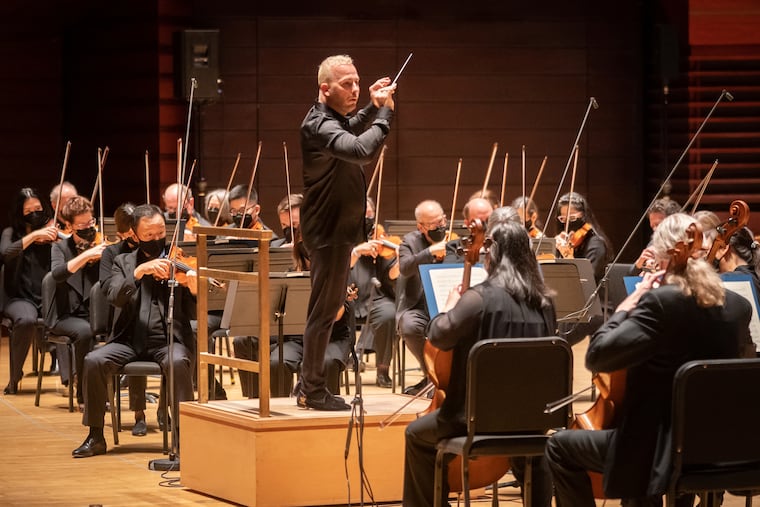In season finale, new Philadelphia Orchestra piece depicts Beethoven in imaginary dialogue
Gabriela Lena Frank's "Pachamama Meets an Ode" and Beethoven's "Symphony No. 9" cap the orchestra's subscription season.

If you think the Philadelphia Orchestra is just about playing pretty music, you probably haven’t been paying close attention for the last few years. Social relevance has become core to the orchestra’s identity.
Don’t believe it?
Race and police brutality, global warming, and the diaspora of oppressed peoples have all filtered into the concert hall this season in various works, some of which were commissioned by the orchestra itself. Friday afternoon, in the program ending its subscription concerts for the season, the orchestra performed a score that takes on colonialism and the destruction of the environment by the Industrial Revolution.
Context is everything. Gabriela Lena Frank’s Pachamama Meets an Ode (2019) is anything but a preachy slog. Rather, the work vibrates with strokes of bold colors on a dark canvas, and makes its case in a musical language of nearly Ravel-like beauty.
Moreover, Frank’s piece was paired with Beethoven’s Symphony No. 9, and the two works had the mysterious effect of one changing the meaning of the other.
The Ninth, of course, is noted for its message of humanity and brotherhood. But Frank’s work carries the sounds of nature, and when the first stirrings of the Beethoven symphony sound later in the program, they, too, seem to take on more naturalistic connotations. The coda to Beethoven’s first movement now seems prophetic, more like a short, angry death march.
Frank doesn’t quote Beethoven’s music in her piece (as other works commissioned for the 250th anniversary of Beethoven’s birth have), but in it she conjures an imaginary meeting between Beethoven and an artist of a roughly contemporaneous movement: the Cusco School of religious painters in Peru. The painter asks “the iconic purveyor of global ‘joy’ to witness and consider” cultural erasure, animal extinction, and the destruction of the environment, according to a program note.
“Beethoven’s hopeful optimism, juxtaposed against the plundering of a land and culture by European colonists, prompted Frank to look again at Beethoven’s era with a new, searching vision. ‘Pachamama asks: What of odes? What of joy?’”
The chorus — here a quite strong Philadelphia Symphonic Choir — tells the story with an orchestral score of beautifully shifting harmonic progressions. Tense and worrisome the music may be, but Frank has that wonderful quality you find in Mozart’s and Schubert’s moments of most concentrated inspiration: musical ideas unfolding in a continuous swath, one growing out of another. This may be a confrontation of worldviews, but it’s a poignantly reported one.
Yannick Nézet-Séguin conducted, and was a smart presence in the work (which received its premiere at Carnegie Hall in February), as he was in the Beethoven. It’s important to remember the miracle of successfully putting on these kinds of forces (orchestra, chorus, vocal soloists) in COVID times. But even apart from that consideration, this was a polished performance, in no small part because of Nézet-Séguin’s detailing and the unified — yet finely colored — 67-voice choir.
The conductor placed the excellent soloists — soprano Angel Blue, mezzo Mihoko Fujimura, tenor Limmie Pulliam, and the spectacular bass-baritone Ryan Speedo Green — along with the choir in the conductor’s circle, a perch that mostly worked well.
The individualistic moments were many: oboist Philippe Tondre’s pastoral tone in the second movement; the way Don S. Liuzzi made his timpani strokes in the third movement more like a string-instrument pizzicato than something from the percussion family; and Ernesto Tovar Torres’ commanding fourth-horn solo that was as expansive in spirit as it was secure across its notoriously wide range.
Nézet-Séguin had the wisdom to let the music speak for itself without any interpretive quirks. When he did imprint his ideas, the emotional insights were rich and valuable: a recapitulation in the first movement of deliciously titanic anger, and, much later, an emergence of the “Ode to Joy” theme that nearly whispered.
Additional performances: Saturday at 8 p.m. and Sunday at 2 p.m. in Verizon Hall, Broad and Spruce Streets. Tickets are $10-$185. philorch.org, 215-893-1999.